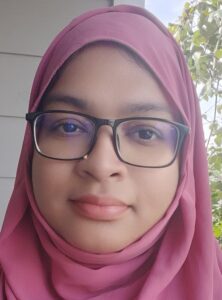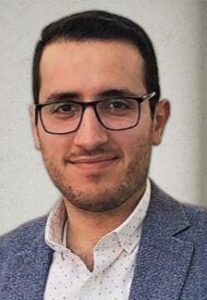 Rashed Albataynehis a PhD student in Civil and Environmental Engineering at Texas A&M University. His research focus is the water, energy, food, (WEF) and health nexus, and involves integrating health into the WEF nexus as both a driver and end outcome of resource management. Rashed holds an MSc in Water and Environmental Engineering and a BSc in Civil Engineering from Jordan University of Science and Technology. Albatayneh contributes to academia as a teaching assistant in the Civil Engineering department Environmental Laboratories, where he developed new pilot-scale experiments, procedures, and handouts to reflect a real-world experience of water and wastewater treatment and control. Professionally, Albatayneh worked as Water and Environmental Engineer at a consultancy firm in Amman, Jordan, where he contributed to multiple internationally funded projects.
Rashed Albataynehis a PhD student in Civil and Environmental Engineering at Texas A&M University. His research focus is the water, energy, food, (WEF) and health nexus, and involves integrating health into the WEF nexus as both a driver and end outcome of resource management. Rashed holds an MSc in Water and Environmental Engineering and a BSc in Civil Engineering from Jordan University of Science and Technology. Albatayneh contributes to academia as a teaching assistant in the Civil Engineering department Environmental Laboratories, where he developed new pilot-scale experiments, procedures, and handouts to reflect a real-world experience of water and wastewater treatment and control. Professionally, Albatayneh worked as Water and Environmental Engineer at a consultancy firm in Amman, Jordan, where he contributed to multiple internationally funded projects.
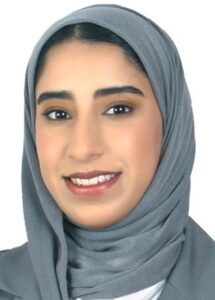 Sara Al-Naabi, lecturer and researcher in the Department of Geography at Sultan Qaboos University, Oman, holds a master’s degree, earned with distinction (2024), in Geography with a specialization in Environmental Studies. Her master’s research, supervised by Dr. Meshal Abdullah, focused on the Water-Food-Climate nexus for managing natural resources under climate change. Using Oman as a case study, she examined the interactions and trade-offs between key environmental variables and their impacts on ecosystem productivity, food security, and water sustainability in arid regions. Currently, Sara is pursuing a PhD in the Water Management and Hydrological Science (WMHS) program at Texas A&M University, under the supervision of Dr. Rabi Mohtar. With a deep commitment to advancing environmental sustainability and resilience, Sara is particularly interested in ecosystem restoration, the WEF (Water-Energy-Food-Ecosystem) nexus, and the application of AI, GIS, and remote sensing in environmental management. She aims to contribute to global research collaboration and develop scalable solutions for ecological challenges in arid and semi-arid regions.
Sara Al-Naabi, lecturer and researcher in the Department of Geography at Sultan Qaboos University, Oman, holds a master’s degree, earned with distinction (2024), in Geography with a specialization in Environmental Studies. Her master’s research, supervised by Dr. Meshal Abdullah, focused on the Water-Food-Climate nexus for managing natural resources under climate change. Using Oman as a case study, she examined the interactions and trade-offs between key environmental variables and their impacts on ecosystem productivity, food security, and water sustainability in arid regions. Currently, Sara is pursuing a PhD in the Water Management and Hydrological Science (WMHS) program at Texas A&M University, under the supervision of Dr. Rabi Mohtar. With a deep commitment to advancing environmental sustainability and resilience, Sara is particularly interested in ecosystem restoration, the WEF (Water-Energy-Food-Ecosystem) nexus, and the application of AI, GIS, and remote sensing in environmental management. She aims to contribute to global research collaboration and develop scalable solutions for ecological challenges in arid and semi-arid regions.
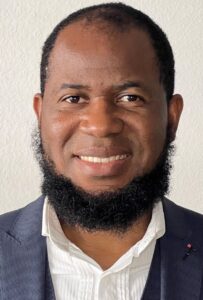 Oteniel Epalanga is a Ph.D. student in the Interdisciplinary Engineering program at Texas A&M University. His research is focused on applying supply chain management principles to the Water-Energy-Food (WEF) Nexus, with the goal of developing integrated solutions that address resource challenges in underserved and vulnerable communities, particularly in Southern Africa. Epalanga holds an M.Sc. in Energy from Texas A&M, where he investigated WEF Nexus challenges in Angola’s southern region. He earned his B.Sc. in Civil Engineering from the Federal University of Santa Catarina (UFSC), Brazil, where he conducted research on wind energy and the feasibility of renewable energy systems. His interdisciplinary approach combines engineering, systems thinking, and WEF Nexus research to inform more resilient, sustainable, and equitable strategies for resource management and development in data-scarce and high-need regions.
Oteniel Epalanga is a Ph.D. student in the Interdisciplinary Engineering program at Texas A&M University. His research is focused on applying supply chain management principles to the Water-Energy-Food (WEF) Nexus, with the goal of developing integrated solutions that address resource challenges in underserved and vulnerable communities, particularly in Southern Africa. Epalanga holds an M.Sc. in Energy from Texas A&M, where he investigated WEF Nexus challenges in Angola’s southern region. He earned his B.Sc. in Civil Engineering from the Federal University of Santa Catarina (UFSC), Brazil, where he conducted research on wind energy and the feasibility of renewable energy systems. His interdisciplinary approach combines engineering, systems thinking, and WEF Nexus research to inform more resilient, sustainable, and equitable strategies for resource management and development in data-scarce and high-need regions.
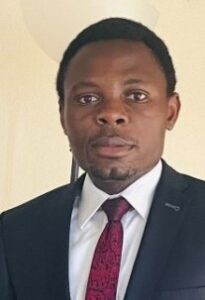 Jean Louis Yannick Omotonoko is a Congolese (DRC) scholar and PhD student in the Water Management & Hydrological Science Department at Texas A&M University. With over a decade of experience across Central Africa, he has contributed to community-based initiatives focused on food security, clean water, renewable energy, and biodiversity conservation through organizations such as WWF, SOS Children’s Villages, Christian Aid and WEF Foundation. During his MSc studies in Water and Sustainable Development at IHE Delft Institute for Water Education, he conducted an in-depth assessment of water-energy-food nexus security in Democratic Republic of Congo, where he developed a causal loop model to support integrated resource management and policy coherence. This work laid the aspiration for his current research interests, which model sustainable food system transformations in Sub-Saharan Africa using agroecology and circular economy frameworks. As a graduate research student with the WEF Nexus Research Group, Jean Louis is committed to advancing inclusive, science-driven strategies that enhance climate resilience, nutrient cycling, and water-energy-food security in vulnerable communities.
Jean Louis Yannick Omotonoko is a Congolese (DRC) scholar and PhD student in the Water Management & Hydrological Science Department at Texas A&M University. With over a decade of experience across Central Africa, he has contributed to community-based initiatives focused on food security, clean water, renewable energy, and biodiversity conservation through organizations such as WWF, SOS Children’s Villages, Christian Aid and WEF Foundation. During his MSc studies in Water and Sustainable Development at IHE Delft Institute for Water Education, he conducted an in-depth assessment of water-energy-food nexus security in Democratic Republic of Congo, where he developed a causal loop model to support integrated resource management and policy coherence. This work laid the aspiration for his current research interests, which model sustainable food system transformations in Sub-Saharan Africa using agroecology and circular economy frameworks. As a graduate research student with the WEF Nexus Research Group, Jean Louis is committed to advancing inclusive, science-driven strategies that enhance climate resilience, nutrient cycling, and water-energy-food security in vulnerable communities.
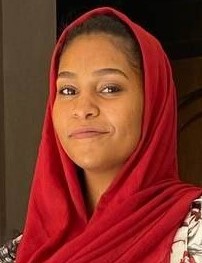 Aya Shigidi holds a bachelor’s degree in civil engineering from the University of Khartoum, Sudan (2021). After receiving her degree, she worked as a Groundwater Modeler in national projects in Sudan and international projects in various countries. Today, Aya is a Water Resources Engineering master’s student in the Civil and Environmental Engineering Department of Texas A&M University, where she also works as a teaching assistant. Aya is employed by Freese and Nichols Inc as a part of the Water Resources Planning Group. As a member of the WEF Nexus Research Group at Texas A&M University under the supervision of Dr Rabi Mohtar, she works on the quantification of a WEF Nexus Framework in an area of conflict in Brazil. She is interested in bridging the gap between the science and policy-making processes by relaying WEF Nexus analysis results to stakeholders and policy makers in a simplified manner and opening the door for science guided conversations.
Aya Shigidi holds a bachelor’s degree in civil engineering from the University of Khartoum, Sudan (2021). After receiving her degree, she worked as a Groundwater Modeler in national projects in Sudan and international projects in various countries. Today, Aya is a Water Resources Engineering master’s student in the Civil and Environmental Engineering Department of Texas A&M University, where she also works as a teaching assistant. Aya is employed by Freese and Nichols Inc as a part of the Water Resources Planning Group. As a member of the WEF Nexus Research Group at Texas A&M University under the supervision of Dr Rabi Mohtar, she works on the quantification of a WEF Nexus Framework in an area of conflict in Brazil. She is interested in bridging the gap between the science and policy-making processes by relaying WEF Nexus analysis results to stakeholders and policy makers in a simplified manner and opening the door for science guided conversations.
Arifa Sultana, Ph.D. student in Civil and Environmental Engineering at Texas A&M University and a Graduate Research Assistant at the Texas Water Resources Institute, does research focused on the Water-Energy-Food (WEF) Nexus with an emphasis on sustainable development. She is currently investigating integrated frameworks and systems-based approaches to enhance policy coherence, evaluate SDG trade-offs and synergies, and scale local sustainability practices to national and global levels. Arifa’s work aims to address data gaps, strengthen governance, and support inclusive, resilient pathways toward achieving the 2030 Agenda for Sustainable Development. Arifa’s master’s degree (Civil and Environmental Engineering, Texas A&M University) emphasized flood modeling, water security, and the impacts of urbanization on flooding. She also contributed to applied research as a Graduate Student Worker at the Texas A&M Transportation Institute, supporting the TxDOT project on non-contact radar stream gauges for improved hydrologic monitoring. Her professional goal is to develop practical, data-driven strategies that translate scientific insights into actionable policy and planning for a more resilient and equitable future.
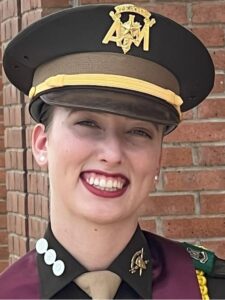 Ashley Voight is a PhD student in Biological and Agricultural Engineering, working under the supervision of Dr. Mohtar. She holds an MSc in Biological and Agricultural Engineering, and her BSc was a double major in Biological and Agricultural Engineering and Ecological Restoration, all from Texas A&M. Ashley’s research is in soil pedostructure: she is looking at how management practices affect the arrangement of soil aggregates in the soil structure and, specifically, how they might affect food production. Ashley’s goal is to improve the soil in ways that improve water efficiency and allow crops to be grown with less irrigation. Ultimately, the aim is to scale-up to allow the determination of the dynamic characteristics of specific soils and their properties to be improved to meet desired outcomes. Ashley’s passion lies in ecology and leans toward microecology and conservation ecology. While her degrees have trained her to look at interactions within a system, her long-term goal is to raise awareness of just how complex these systems are, and to find a balanced way to preserve our natural resources and save our native species.
Ashley Voight is a PhD student in Biological and Agricultural Engineering, working under the supervision of Dr. Mohtar. She holds an MSc in Biological and Agricultural Engineering, and her BSc was a double major in Biological and Agricultural Engineering and Ecological Restoration, all from Texas A&M. Ashley’s research is in soil pedostructure: she is looking at how management practices affect the arrangement of soil aggregates in the soil structure and, specifically, how they might affect food production. Ashley’s goal is to improve the soil in ways that improve water efficiency and allow crops to be grown with less irrigation. Ultimately, the aim is to scale-up to allow the determination of the dynamic characteristics of specific soils and their properties to be improved to meet desired outcomes. Ashley’s passion lies in ecology and leans toward microecology and conservation ecology. While her degrees have trained her to look at interactions within a system, her long-term goal is to raise awareness of just how complex these systems are, and to find a balanced way to preserve our natural resources and save our native species.
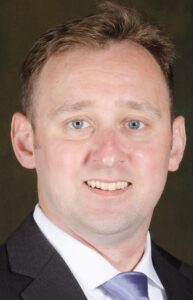 Joel Wiggins is an MSc student at the Texas A&M Energy Institute, and holds an undergraduate degree in geology from Texas A&M. Having been primarily supported by the energy sector for most of his life, Joel views energy access as a fundamental right. He has presented on energy equity’s role in disasters and participated in a bilateral exchange with Greek scholars examining the economic, social, and environmental impacts of a rapid energy transition in both Greece and Texas. As a thesis student with the WEF Nexus Research Group, Joel is focusing on measures of energy equity to ensure that policy is driven by an informed populace capable of ensuring affordable, resilient, and optimized energy for all.
Joel Wiggins is an MSc student at the Texas A&M Energy Institute, and holds an undergraduate degree in geology from Texas A&M. Having been primarily supported by the energy sector for most of his life, Joel views energy access as a fundamental right. He has presented on energy equity’s role in disasters and participated in a bilateral exchange with Greek scholars examining the economic, social, and environmental impacts of a rapid energy transition in both Greece and Texas. As a thesis student with the WEF Nexus Research Group, Joel is focusing on measures of energy equity to ensure that policy is driven by an informed populace capable of ensuring affordable, resilient, and optimized energy for all.

 WEF Nexus Research Group
WEF Nexus Research Group